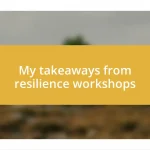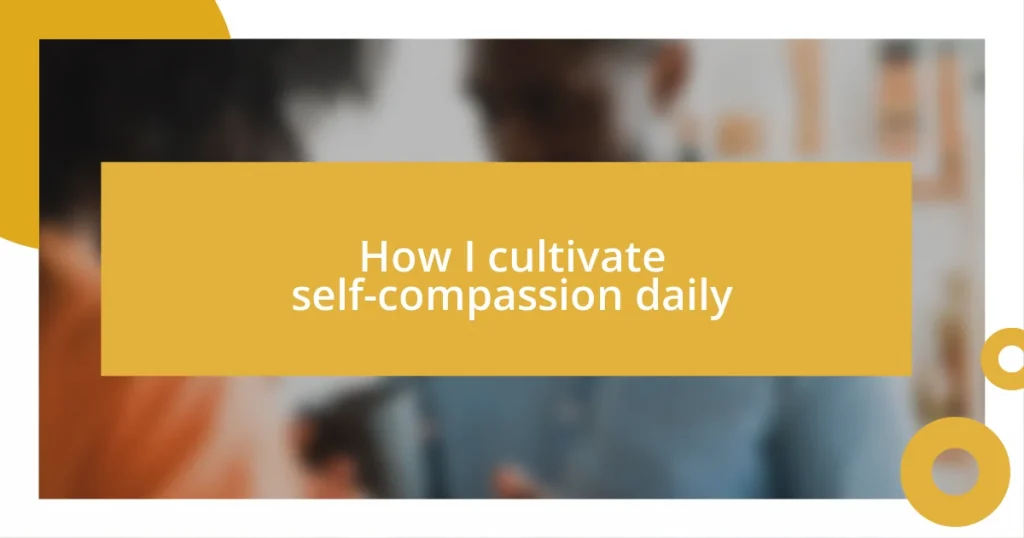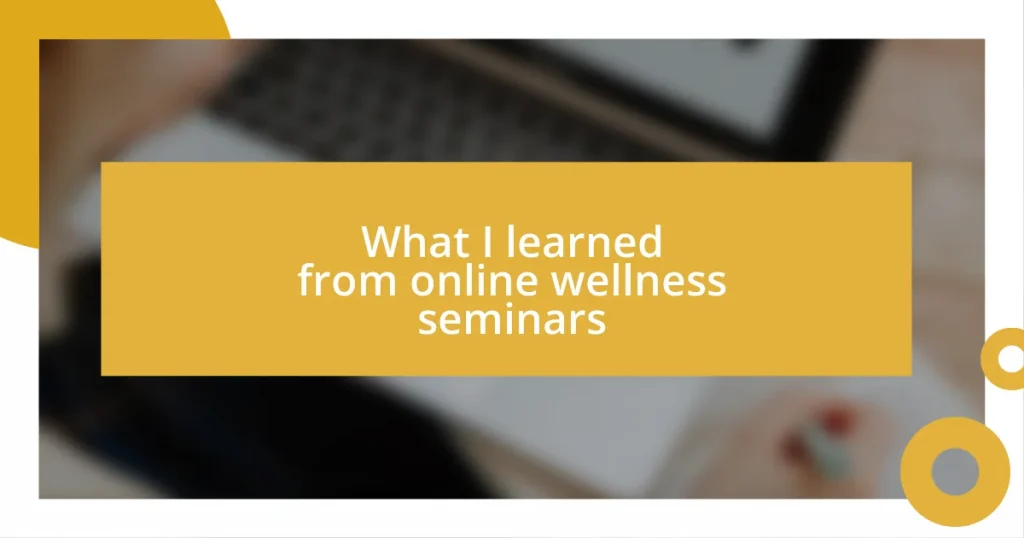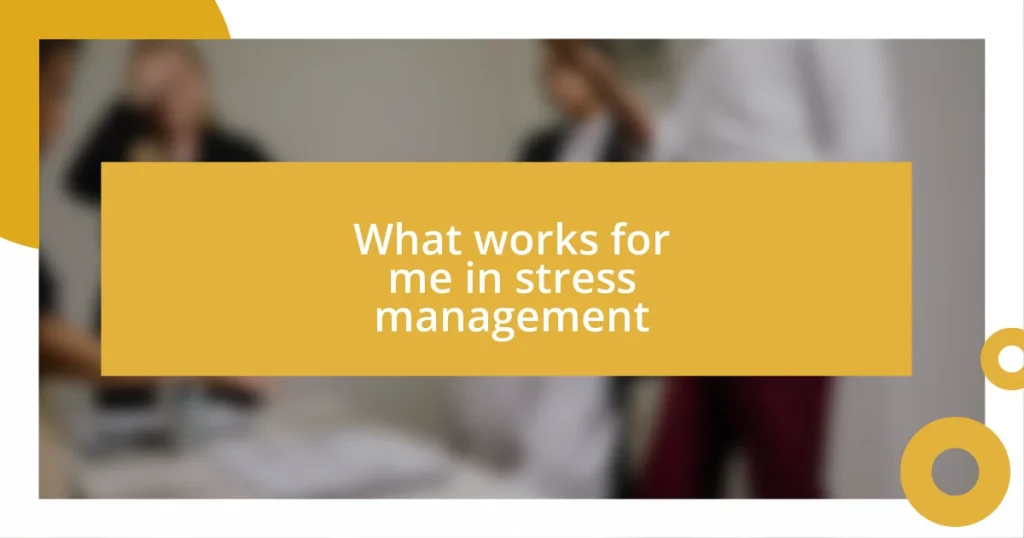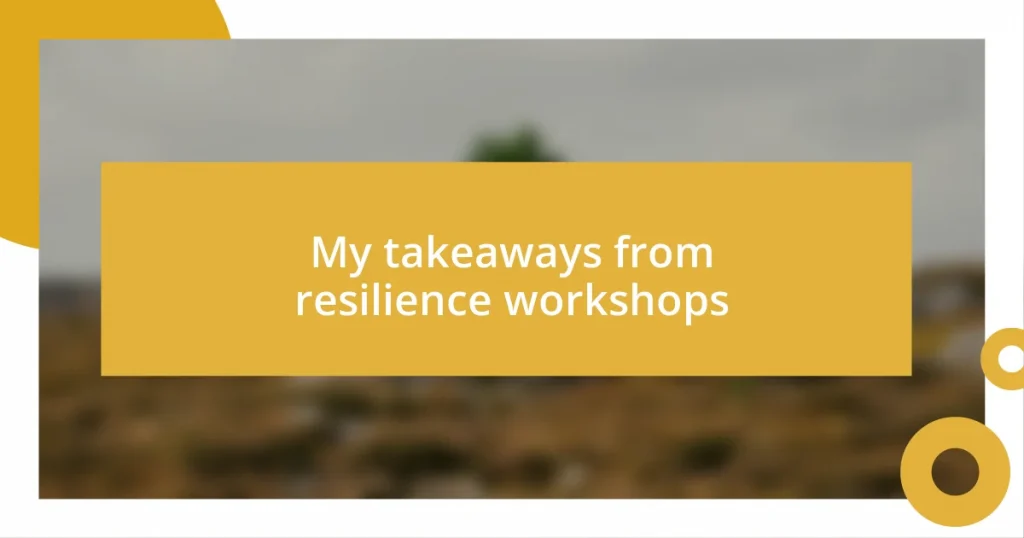Key takeaways:
- Self-compassion enhances resilience and reduces stress, fostering a more supportive relationship with oneself and others.
- Daily practices such as affirmations, mindful breathing, and journaling help cultivate self-kindness and reflection.
- Creating a supportive environment and surrounding oneself with positive influences is crucial for nurturing self-compassion and emotional well-being.
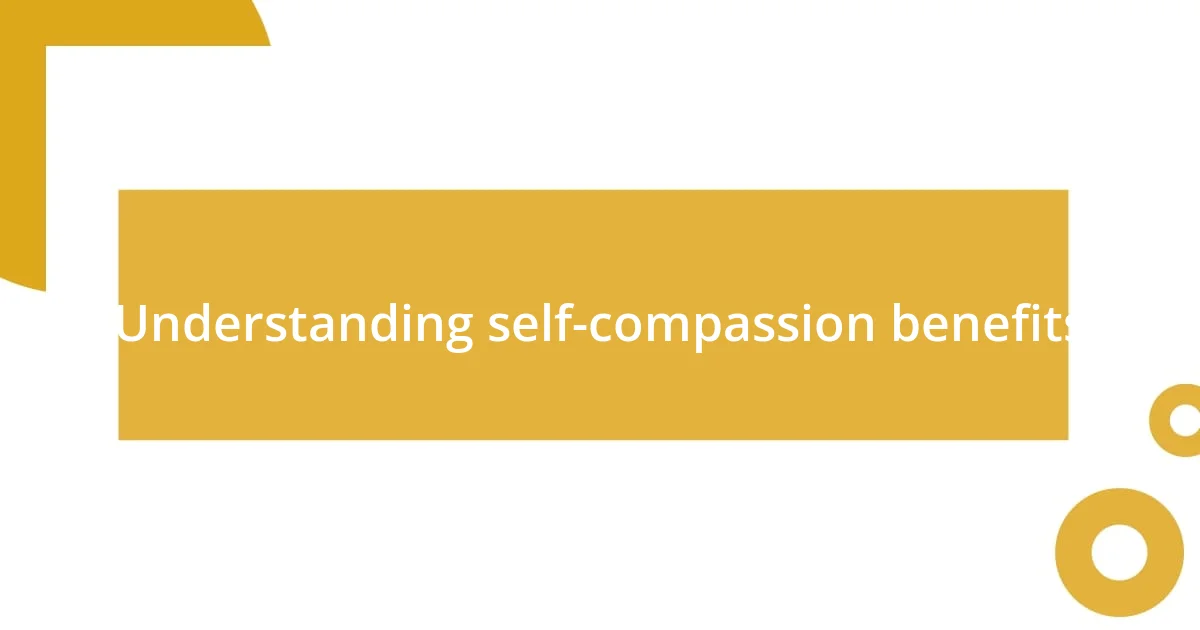
Understanding self-compassion benefits
Self-compassion has been a game changer for me, especially during those tough times when I’m my own worst critic. I remember an instance when I failed at a project I really poured my heart into. Instead of spiraling into self-doubt, I paused and asked myself, “What if a friend came to me with this same situation?” This shift in perspective made me more loving toward myself, highlighting how self-compassion fosters resilience, helping us bounce back from setbacks.
Moreover, I’ve noticed that practicing self-compassion significantly lowers my stress levels. When I embrace my imperfections and allow myself to feel emotions without judgment, it feels liberating. Isn’t it fascinating how acknowledging our struggles can lead to a lighter, more graceful approach to life? I often reflect on how letting go of harsh self-criticism can create space for growth and healing.
Lastly, self-compassion nurtures a deeper connection with ourselves and others. I’ve found that when I treat myself with kindness, it opens my heart to be more supportive and understanding toward those around me. Have you ever considered how your relationship with yourself directly impacts your relationships with others? By cultivating self-compassion, we not only enhance our self-worth but also enrich our social connections, creating a ripple effect of kindness outward.

Daily self-compassion practices
I often start my day with a simple practice: I look in the mirror and remind myself to treat my reflection as I would a dear friend. This small act of kindness sets a positive tone for my day. I focus on three affirmations that resonate with me. Each morning, I tell myself, “I am enough,” “I deserve love,” and “I am doing my best.” It’s amazing how these words can shift my mindset, making me more compassionate toward myself as I navigate life’s challenges.
Throughout the day, I also make it a habit to check in with my feelings. When I sense stress or anxiety creeping in, I take a few moments to pause and breathe deeply. I ask myself, “What do I truly need right now?” This self-inquiry invites compassion into the moment, helping me identify whether I need rest, a kind word, or perhaps a break from my tasks. I find that these brief pauses create a buffer against overwhelm and encourage meaningful self-dialogue.
In the evenings, I embrace a reflective journaling ritual. I jot down things I’m grateful for and challenges I faced, pairing those experiences with gentle self-reflection. By allowing myself to explore both the highs and lows, I find clarity and acceptance. It’s comforting to recognize that every day is a blend of successes and struggles, and by weaving compassion through my reflections, I cultivate a nurturing perspective on life.
| Practice | Description |
|---|---|
| Morning Affirmations | Start your day by affirming your self-worth with three positive declarations. |
| Midday Check-ins | Pause to identify your feelings and needs, allowing for compassion in the moment. |
| Evening Journaling | Reflect on your day by noting gratitude and challenges, embracing self-reflection. |

Mindfulness techniques for self-compassion
Mindfulness is a powerful tool in cultivating self-compassion, and I’ve discovered a few techniques that truly resonate with me. One method I often utilize is mindful breathing. When I feel the weight of the world on my shoulders, I take a moment to focus solely on my breath, inhaling deeply and exhaling slowly. This grounding practice reminds me that it’s okay to just be – a gentle nudge that encourages self-kindness in times of stress. I’ve found that just a few minutes of this calming exercise can transform my mood, allowing me to approach my feelings with a nourishing mindset.
- Mindful Breathing: Focus on your breath to cultivate a sense of presence and calm during overwhelming moments.
- Body Scan Meditation: I lie down comfortably and mentally check in with each part of my body, acknowledging areas of tension while reminding myself that it’s okay to feel whatever arises.
- Compassionate Self-Talk: When negative thoughts emerge, I pause and consciously reframe them. I challenge myself to respond as I would to a fellow human, recognizing that everyone has tough days.
Another technique I’ve integrated into my routine is gratitude meditation. Each evening, while reflecting on the day, I express gratitude for three specific moments, even if they’re small. This practice not only helps me appreciate the positives but also nurtures compassion for the times I felt challenged. I’ve realized that these moments of gratitude create a beautiful balance, reminding me that even in imperfection, there is so much to be thankful for. It’s a daily reminder that life’s beauty lies in its ups and downs.
- Gratitude Meditation: Each night, reflect on three enjoyable moments from your day, fostering a positive outlook on challenges.
- Kindness Mantra: I repeat a simple phrase like, “May I be kind to myself today,” reinforcing a compassionate mindset.
- Self-Compassion Breaks: When faced with a difficult emotion, I take a few minutes to pause, acknowledging my feelings with a warm, friendly mindset.
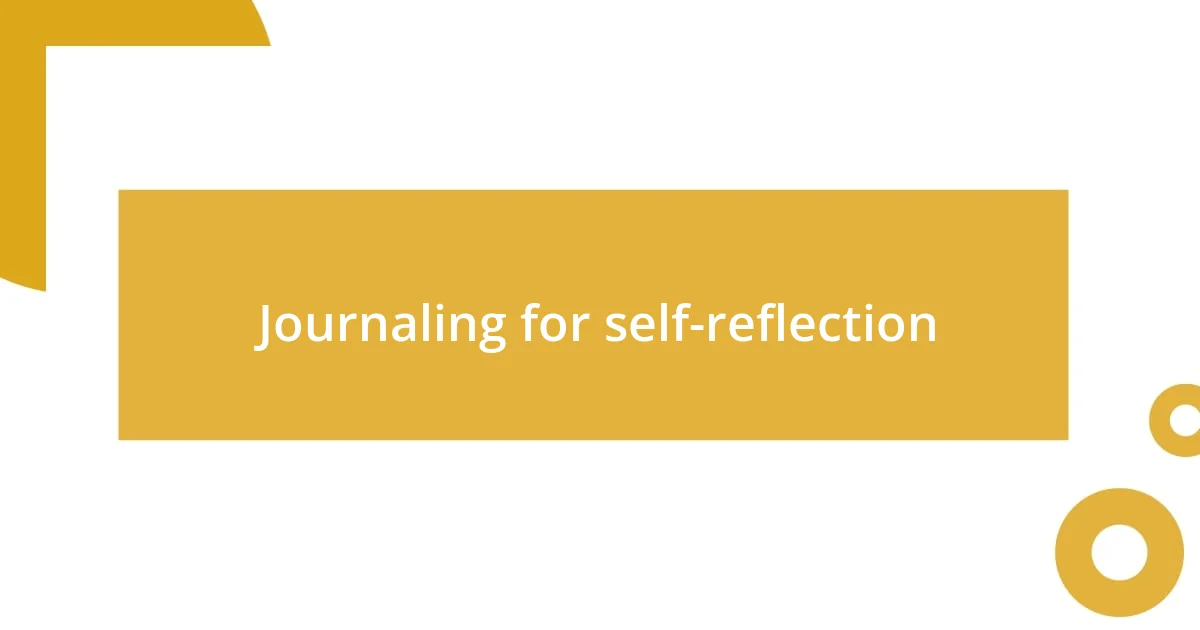
Journaling for self-reflection
Journaling has become a vital tool for my self-reflection practice. Each evening, I carve out time to put pen to paper, capturing the ebb and flow of my emotions throughout the day. I vividly recall a particularly hectic week when I felt overwhelmed. As I wrote, I unloaded my frustrations and fears, and by the end of the session, I uncovered a sense of clarity about my needs and aspirations. Does journaling often lead you to those “aha!” moments too?
There are days when I find it challenging to reflect, especially when emotions run high. During one such evening, I simply listed my feelings with no judgment, allowing them to flow freely on the pages. It felt liberating to write, “I feel anxious, I feel frustrated, I feel tired.” Acknowledging these emotions transformed my experience; I realized they’re valid, and from that acceptance, I could cultivate compassion. Have you ever noticed how validating our feelings can shift our perspective?
In my journaling, I also prioritize gratitude, turning it into a ritual. I remember a time when I felt bogged down by negativity, and reflecting on just three positive moments from my day—like a kind compliment from a colleague or a cup of warm tea—made a profound difference. It’s as if those small glimmers of joy act as anchors, grounding me amidst the chaos. As I write, I often ask myself, “What made my heart smile today?” This simple question invites a sense of wonder and appreciation for life, no matter how challenging it may feel.

Affirmations to boost self-kindness
Affirmations have become an essential part of my daily practice in nurturing self-kindness. I often find myself repeating phrases like, “I am worthy of love and kindness” in front of the mirror. It’s surprising how a simple affirmation can shift my mindset, especially on days when self-doubt creeps in. Have you ever noticed how what we tell ourselves can either uplift or weigh us down?
Sometimes, I create personalized affirmations that resonate with specific challenges I’m facing. There was a time I struggled with perfectionism and would tell myself, “It’s okay to make mistakes; they are stepping stones to learning.” This simple reminder softened my inner critic, allowing me to embrace my humanity instead of punishing myself for flaws. It’s as if those words create a gentle barrier that keeps negativity at bay.
Occasionally, I experiment with writing my affirmations down and placing them where I can see them every day, like on my desk or bathroom mirror. I vividly remember designing a colorful poster with statements like, “I choose to treat myself with tenderness,” and it brought a smile to my face every time I walked by it. Surrounding myself with these reminders has become like having a kind friend whispering encouragement into my ear. How do you think integrating affirmations into your space could impact your self-kindness journey?

Overcoming barriers to self-compassion
Sometimes, I find that the biggest barrier to self-compassion is my inner critic. There are moments when I hear that nagging voice whispering that I’m not doing enough or that I’ve failed yet again. One particularly tough day, I caught myself drowning in negative thoughts after a small mistake at work. Instead of indulging those feelings, I paused and questioned, “Would I speak to a friend this way?” This shift in perspective opened a door to self-kindness, reminding me that everyone falters and that it’s perfectly human to be imperfect.
I’ve also learned that external pressures can hinder my self-compassion. The world often seems to demand so much from us, creating a toxic cycle of comparison and inadequacy. I can recall a phase when scrolling through social media left me feeling deflated and unworthy. It took an intentional timeout from those platforms for me to regain my footing. After distancing myself, I noticed how much easier it was to appreciate my unique journey without the noise of others clouding my self-awareness. Have you ever felt the weight of external expectations pushing down on your ability to be gentle with yourself?
Lastly, cultivating self-compassion requires patience, and I’ve had to remind myself that it’s okay to stumble along the way. There are days when I still grapple with feelings of anger or frustration towards myself. On one such morning, instead of suppressing those emotions, I decided to sit with them. I brewed a soothing cup of tea, allowing the warmth to envelop me as I sat quietly, recognizing those feelings. This practice transforms my perspective, showing me that even in moments of struggle, I am deserving of compassion. What have you done to embrace your emotional ups and downs?

Building a supportive environment
Building a nurturing environment is crucial for fostering self-compassion. I’ve found that surrounding myself with supportive people amplifies my journey toward kindness. For instance, I remember having coffee with a friend who radiates positivity; her affirmations include reminders about our worthiness. Each conversation with her feels like a gentle nudge back to self-love, reinforcing the idea that we are all deserving of kindness and support from one another.
Creating a personal sanctuary for self-care has also been transformative. Basking in a warm bath with soft music playing in the background creates a magical space where I can reconnect with myself without judgment. I’ve carved out little corners in my home filled with plants, inspiring quotes, and cozy blankets, cultivating an environment that whispers, “You matter.” Have you considered how your physical surroundings affect your emotional state?
Moreover, I actively choose media that aligns with my journey. This means curating my social media feed to include accounts that uplift and inspire rather than those that induce comparison. A few months ago, I unfollowed several influencers whose content left me feeling inadequate. Instead, I embraced voices that advocate for authenticity and self-care. I’ve realized that what I consume—be it stories, videos, or articles—shapes my mindset profoundly. What steps have you taken to ensure your external influences foster positivity in your life?


